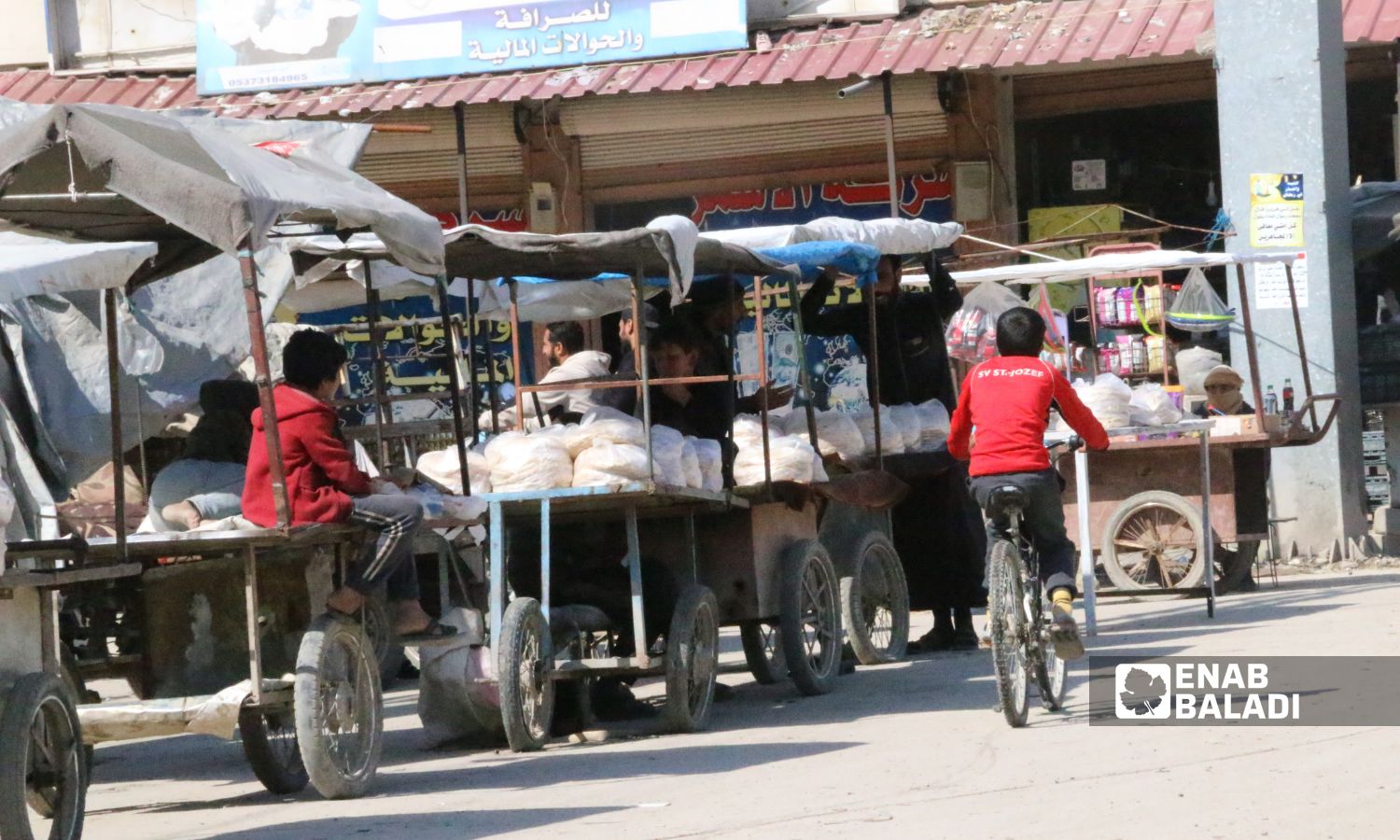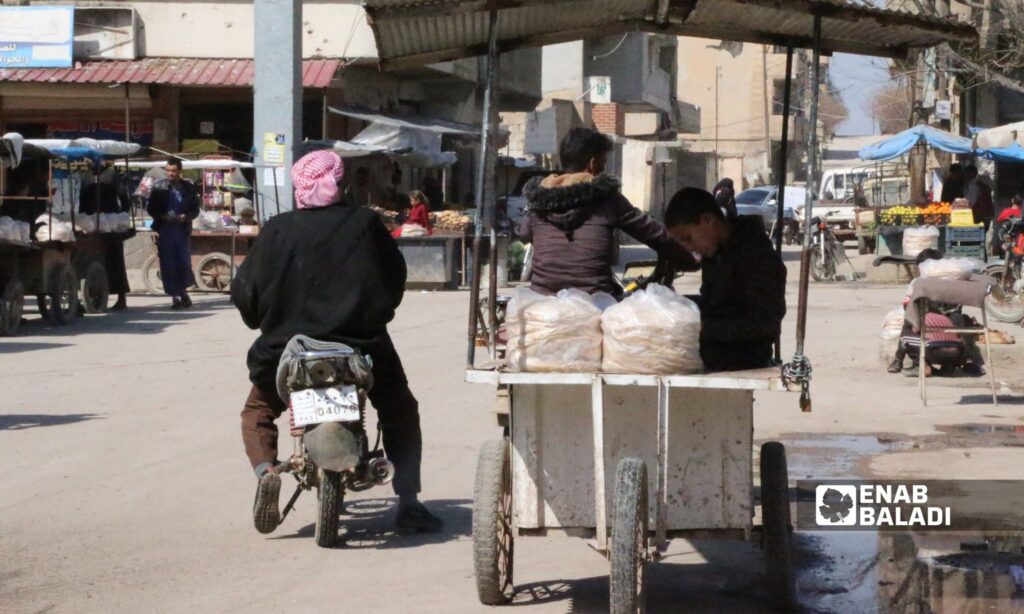The bread crisis continues for the third week in the city of Ras al-Ain, northwest of al-Hasakah, and securing this basic commodity for the residents has become a heavy burden on them, especially during the month of Ramadan, where the crisis has worsened with the increased demand.
Markets are witnessing an increased demand for bread amid a shortage of the commodity, prompting residents to look for alternatives to meet their needs, but even these alternatives are expensive, as a worker’s wage does not exceed two US dollars per day (equivalent to 30,000 Syrian pounds).
Tenfold increase
Bread bundles are sold at stalls and by itinerant vendors at prices that have reached 17,000 Syrian pounds per bundle (ten loaves weighing 1100 grams), an increase of more than tenfold over the price at the bakery.
The same bundle is still sold in bakeries at around 1,500 Syrian pounds, but the quantities produced are less than needed due to the scarcity of flour.
The bakery’s normal production on regular days reaches 30,000 bundles daily, covering the city and the countryside entirely, but currently, production has decreased to about 15,000 bundles a day.

A bundle of bread is sold for 17,000 Syrian pounds in the markets of Ras al-Ain, northwest of al-Hasakah – March 14, 2024 (Enab Baladi)
Four costly alternatives
Enab Baladi monitored the prices of several types of bread prepared by small bakeries in Ras al-Ain, including four types: Mashrouh, Samoon, Saj, and Tandoor.
Mashrouh bread is sold at 3,000 Syrian pounds for the large loaf and 1,500 Syrian pounds for the small one, and as for Samoon, there is not much demand for it, with each piece priced at 2,500 Syrian pounds.
The price of Saj bread loaf is 2,000 Syrian pounds, and for Tandoor bread, the large loaf is sold for 3,500 Syrian pounds and 2,500 Syrian pounds for the small loaf.
A bundle of bread is sold for 17,000 Syrian pounds in the markets of Ras al-Ain, northwest of al-Hasakah – March 14, 2024 (Enab Baladi)
In the countryside house
Despite the existence of four alternative types of bread to bakery bread, their prices do not align with the residents’ purchasing power, so some have turned to other alternatives by preparing it at home or relying on rural folks to secure bread by baking it on Saj or Tandoor.
Maher Ali, a resident of Ras al-Ain, told Enab Baladi that his family of nine cannot afford to buy bread from the stalls daily due to the high prices, which led them to temporarily move to their village, al-Mabruka, where flour is available in sufficient quantities.
Ali added that the family prepares bread daily at his father’s house using Tandoor and Saj, a temporary solution at least to ensure bread provision during Ramadan.
He called for the relevant authorities to fulfill their commitments to the residents, after they promised the locals to solve the bread crisis before Ramadan, but the situation only worsened.
A bundle of bread is sold for 17,000 Syrian pounds in the markets of Ras al-Ain, northwest of al-Hasakah – March 14, 2024 (Enab Baladi)
On her part, Aisha Okab from Ras al-Ain told Enab Baladi that she resorted to buying bread before iftar from small bakeries, at a price of 3,000 Syrian pounds for the Mashrouh loaf.
She added that her family, consisting of seven people, needs 60,000 Syrian pounds daily to meet their needs for iftar and suhoor, while previously they needed 6,500 Syrian pounds.
She pointed out that she tried to buy flour, but faced difficulty obtaining it due to residents purchasing all the available quantities in the market.
Promises to secure flour
The reason for the decrease in the quantities produced by the only automatic bakery in Ras al-Ain is the inventory carried out by the Turkish Disaster and Emergency Management Authority (AFAD) for the quantities of flour entering the city each year in February, according to a previous report prepared by Enab Baladi.
Flour enters Ras al-Ain monthly for free, and the incoming quantities are 600 tons, but the automatic bakery has currently reduced bread production quantities to preserve a flour reserve of 40 tons.
The official spokesperson for the local council in Ras al-Ain, Ziad Maliki, told Enab Baladi that the council buys flour daily to provide bread to the city’s residents in moderate quantities.
He explained that the automatic bakery did not completely stop production during this period, but the shortage of flour led to a reduction in productivity and consequently a shortage of bread in the city and the countryside.
He indicated that the local council would work on purchasing larger quantities of flour to continue providing bread to the citizens until the AFAD organization sends flour to the city of Ras al-Ain, which contributes to the bakery returning to its previous productivity reaching 30,000 bundles daily, and fully supplying the area.
Maliki mentioned that the AFAD organization informed the local council that it would send flour soon to secure the bread for the residents, but did not specify the exact timing.
Ras al-Ain and Tal Abyad are located along the Turkish border and are controlled by the Turkey-backed Syrian National Army (SNA), while the fronts of combat with the Syrian Democratic Forces (SDF) surround them, with the Turkish border being their only outlet to the exterior.
Agriculture, along with livestock breeding, are the primary professions that the majority of residents in the Ras al-Ain area and the northern and northeastern regions of Syria engage in, and they constitute a main source of income in these areas.
https://youtu.be/5M6cOIt-Glo











